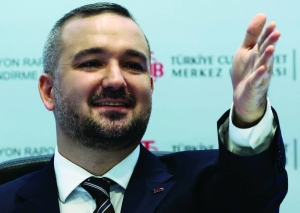News
Turkiye rules out early rate cuts, keeps focus on monthly prices


Turkish Central Bank Governor Fatih Karahan.
Turkiye’s central bank said it will keep monetary policy restrictive until it sees a permanent slowdown in monthly inflation, underscoring its commitment to stay away from premature interest rate cuts.
“We need to see a marked and lasting deceleration in main inflation dynamics,” Governor Fatih Karahan said in Ankara on Thursday. “It’s clear that there is a drop in [monthly] inflation rates recently. But we aren’t sufficiently sure that it’s here to stay.” Karahan was speaking at a quarterly presentation on his inflation outlook, which he kept unchanged for this year and next. His forecasts serve as interim targets for the monetary policy, and maintaining them is a sign the bank will stick to its tight stance.
Annual consumer inflation will likely slow to 38% at the end of 2024 and finish the following year at 14%, down from 62%, one of the highest rates in the world. Much of that is a consequence of ultra-loose monetary and fiscal policies that officials began to reverse last year, when the bank’s rate setting committee got reshuffled. Karahan and others at the Monetary Policy Committee hiked rates to 50% from 8.5% since June 2023.
The bank will “hold rates unchanged at least till the end of the year,” QNB Finansbank Chief Economist Erkin Isik said after Karahan’s remarks. “They will likely keep policy rate considerably above inflation” to bring it down to single digits eventually, he said.
In explaining his decision to keep the forecasts, Karahan cited a weakening domestic demand, which roughly accounts for two-thirds of Turkiye’s economy. He also kept food inflation expectations unchanged for this year and next. Oil prices will be marginally lower this year and somewhat higher in 2025 than the bank’s expectations in April, he said.
Monetary policy by definition can remain tight even after rate cuts, the governor said in response to a question following the inflation report’s release.
But the overall message during his speech was “tighter for longer,” according to Altug Ozaslan, chief executive officer of investment consultancy Fortuna Capital in Istanbul.
Some Wall Street banks, including JPMorgan Chase & Co and Bank of America, see the start of an easing cycle as soon as the fourth quarter. Karahan told Bloomberg in an interview last month that he wants to ensure he can meet inflation goals beyond this year before discussing interest-rate cuts.
“We see a balancing on the demand side,” Karahan said during his presentation. “Therefore, we didn’t see a reason to change our predictions taking into account data that’s been in line with our forecasts.”
Turkish Treasury and Finance Minister Mehmet Simsek said this week that he sees year-end inflation to be around 40%.
“We need to see a marked and lasting deceleration in main inflation dynamics,” Governor Fatih Karahan said in Ankara on Thursday. “It’s clear that there is a drop in [monthly] inflation rates recently. But we aren’t sufficiently sure that it’s here to stay.” Karahan was speaking at a quarterly presentation on his inflation outlook, which he kept unchanged for this year and next. His forecasts serve as interim targets for the monetary policy, and maintaining them is a sign the bank will stick to its tight stance.
Annual consumer inflation will likely slow to 38% at the end of 2024 and finish the following year at 14%, down from 62%, one of the highest rates in the world. Much of that is a consequence of ultra-loose monetary and fiscal policies that officials began to reverse last year, when the bank’s rate setting committee got reshuffled. Karahan and others at the Monetary Policy Committee hiked rates to 50% from 8.5% since June 2023.
The bank will “hold rates unchanged at least till the end of the year,” QNB Finansbank Chief Economist Erkin Isik said after Karahan’s remarks. “They will likely keep policy rate considerably above inflation” to bring it down to single digits eventually, he said.
In explaining his decision to keep the forecasts, Karahan cited a weakening domestic demand, which roughly accounts for two-thirds of Turkiye’s economy. He also kept food inflation expectations unchanged for this year and next. Oil prices will be marginally lower this year and somewhat higher in 2025 than the bank’s expectations in April, he said.
Monetary policy by definition can remain tight even after rate cuts, the governor said in response to a question following the inflation report’s release.
But the overall message during his speech was “tighter for longer,” according to Altug Ozaslan, chief executive officer of investment consultancy Fortuna Capital in Istanbul.
Some Wall Street banks, including JPMorgan Chase & Co and Bank of America, see the start of an easing cycle as soon as the fourth quarter. Karahan told Bloomberg in an interview last month that he wants to ensure he can meet inflation goals beyond this year before discussing interest-rate cuts.
“We see a balancing on the demand side,” Karahan said during his presentation. “Therefore, we didn’t see a reason to change our predictions taking into account data that’s been in line with our forecasts.”
Turkish Treasury and Finance Minister Mehmet Simsek said this week that he sees year-end inflation to be around 40%.



